- Page 2 and 3:
Lone Gunman or Patsy: A Cultural Hi
- Page 4 and 5:
TABLE OF CONTENTS Page List of Figu
- Page 6 and 7:
ABSTRACT LONE GUNMAN OR PATSY: A CU
- Page 8 and 9:
The Warren Commission's critics dre
- Page 10 and 11:
. Figure 1: Jack Ruby Guns Down Osw
- Page 12 and 13:
symbolized - what they meant - to t
- Page 14 and 15:
The Warren Commission, instead of f
- Page 16 and 17:
This dissertation will delve into t
- Page 18 and 19:
writes, “Following the assassinat
- Page 20 and 21:
events as validating their coverage
- Page 22 and 23:
and youthful protest. Authors Norma
- Page 24 and 25:
Figure 2: Infamous Photograph of Os
- Page 26 and 27:
material that links him to extreme
- Page 28 and 29:
congressional inquiry, take the inv
- Page 30 and 31:
uncover all the facts of the case a
- Page 32 and 33:
than his Confederate sympathies, an
- Page 34 and 35:
Cermak.” 38 The Warren Commission
- Page 36 and 37:
there is any such evidence it has b
- Page 38 and 39:
avowed commitment to Marxism. The s
- Page 40 and 41:
examination did not indicate that L
- Page 42 and 43:
The blame for this, according to th
- Page 44 and 45:
One Marine even testified that he t
- Page 46 and 47:
Union. At the very least, Oswald’
- Page 48 and 49:
Oswald, which is hard to believe if
- Page 50 and 51:
writing “The Soviets have committ
- Page 52 and 53:
his promise, Oswald soon threatened
- Page 54 and 55:
Bringuier incident, and brushed asi
- Page 56 and 57:
may well have been Oswald’s escap
- Page 58 and 59:
Democrats and Republicans, except f
- Page 60 and 61:
identifications, the conduct of pol
- Page 62 and 63:
to make it less definitive. He woul
- Page 64 and 65:
either meat or eggs, but refused de
- Page 66 and 67:
CHAPTER 2: OSWALD THE NUT The Warre
- Page 68 and 69:
Ford and Stiles used information fr
- Page 70 and 71:
the importance of reasonable human
- Page 72 and 73:
answerable” for his research or n
- Page 74 and 75:
Manchester suggesting someone viewi
- Page 76 and 77:
She then told her mother, “He [JF
- Page 78 and 79:
had, of necessity, spent time in or
- Page 80 and 81:
up his life can kill any leader in
- Page 82 and 83:
perceive a crevice of warmth. No ma
- Page 84 and 85:
members, of his family for whom he
- Page 86 and 87:
zoo.’” 160 Surely, this childho
- Page 88 and 89:
In her conclusion, Holloway quoted
- Page 90 and 91:
assassination. At one point she tol
- Page 92 and 93:
who she interviewed in Moscow with
- Page 94 and 95:
events leading up to the assassinat
- Page 96 and 97:
emotionally, altogether too much to
- Page 98 and 99:
done or said before him.” 195 He
- Page 100 and 101:
Corps handbook. He remembered Lee
- Page 102 and 103:
dates leading up to the assassinati
- Page 104 and 105:
CHAPTER 3: OSWALD THE RED Some writ
- Page 106 and 107:
Oswald was the lone assassin and wa
- Page 108 and 109:
Newman outlined Oswald’s growing
- Page 110 and 111:
left-wing beliefs very seriously. I
- Page 112 and 113:
was carried out as a result of Oswa
- Page 114 and 115:
Kennedy - who was (allegedly) respo
- Page 116 and 117:
exploding the bomb from a nearby su
- Page 118 and 119:
associated with Bobby Kennedy’s e
- Page 120 and 121:
Assassination. He recounted his mee
- Page 122 and 123:
that he was “hysterical” when d
- Page 124 and 125:
defenders. 256 Although his book is
- Page 126 and 127:
States and the CIA. Pacepa denounce
- Page 128 and 129:
assume, at a minimum, that Oswald k
- Page 130 and 131:
point, it is hard to believe Oswald
- Page 132 and 133:
Showing the many ways Oswald’s ac
- Page 134 and 135:
1962 Cuban Missile Crisis. This und
- Page 136 and 137:
of his personal frustration than of
- Page 138 and 139:
famous: “Notoriety…probably mea
- Page 140 and 141:
that in New Orleans Oswald suggeste
- Page 142 and 143:
who believed he had been abused and
- Page 144 and 145:
primarily as the pawn of the sinist
- Page 146 and 147:
Figure 3: A Subversive Re-Visioning
- Page 148 and 149:
Oswald. Lee was moved by what peopl
- Page 150 and 151:
some sense, true and false in some
- Page 152 and 153:
counter-balance some of the positiv
- Page 154 and 155:
what the commission called, “His
- Page 156 and 157:
telling his oldest buddies to get l
- Page 158 and 159:
iases. The black marketer, Mike Cer
- Page 160 and 161:
“the seven seconds that broke the
- Page 162 and 163:
when I saw him in Moscow.” 349 Th
- Page 164 and 165:
Libran. He is capable of seeing the
- Page 166 and 167:
quagmire at the center of a conspir
- Page 168 and 169:
Oswald marriage from the beginning.
- Page 170 and 171:
funny about Oswald’s alleged phys
- Page 172 and 173:
in dirty diapers as a child.” 372
- Page 174 and 175:
Oswald - even though Mailer believe
- Page 176 and 177:
proprietor proclaim “Free country
- Page 178 and 179:
“immortality” and reassert them
- Page 180 and 181:
consortium of jealous husbands fire
- Page 182 and 183:
“Lee Harvey Oswald…trained with
- Page 184 and 185:
Chicago to arrange Giancana’s tes
- Page 186 and 187:
assassination plot. Noyes suggested
- Page 188 and 189:
Noyes stated that the title of his
- Page 190 and 191:
oth Gonzalez and Sprague resigned,
- Page 192 and 193:
and Connally and, the third shot fr
- Page 194 and 195:
values were those of a self-proclai
- Page 196 and 197:
Bureau.” 427 The panel found noth
- Page 198 and 199:
of a cover-up, as many Warren Commi
- Page 200 and 201:
other the Attorney General.” 436
- Page 202 and 203:
November 9, 1963, Miami police info
- Page 204 and 205:
Blakey explained that the Committee
- Page 206 and 207:
Sinatra introduced Kennedy to Judit
- Page 208 and 209:
Scheim placed the Kennedy assassina
- Page 210 and 211:
“Jack Ruby’s occupational pursu
- Page 212 and 213:
about the assassination. Ragano sai
- Page 214 and 215:
and social outcast, but he came to
- Page 216 and 217:
charges in the 1980’s, but was ev
- Page 218 and 219:
advocates that the Mafia was respon
- Page 220 and 221:
The double Oswald theory is a key c
- Page 222 and 223:
threatened with prosecution” for
- Page 224 and 225:
declared that the witness testimony
- Page 226 and 227:
from Mrs. Sylvia Odio.” 495 He di
- Page 228 and 229:
British researcher Michael Eddowes
- Page 230 and 231:
young man who had been away for a c
- Page 232 and 233:
examination of the remains on Octob
- Page 234 and 235:
niece of a high-ranking Soviet offi
- Page 236 and 237:
Even stranger is the tale told of a
- Page 238 and 239:
devised. 526 The object was to carr
- Page 240 and 241:
Harvey Oswald, the CIA, and Mind Co
- Page 242 and 243:
multiple personalities could explai
- Page 244 and 245:
as well as those of Martin Luther K
- Page 246 and 247:
plot made sense ideologically, as w
- Page 248 and 249:
as some army figures such as Genera
- Page 250 and 251:
more favorable reception in the pre
- Page 252 and 253:
extreme right-winger” - Theodore
- Page 254 and 255:
forward, and I was able to direct t
- Page 256 and 257:
that he believed David Ferrie was t
- Page 258 and 259:
According to Garrison, Oswald was
- Page 260 and 261:
guidance of Ferrie and Bannister to
- Page 262 and 263:
assassination. In his book, Lane ac
- Page 264 and 265:
likelihood there does not exist a s
- Page 266 and 267:
complained that the talk show host
- Page 268 and 269:
any worse than others,” and he de
- Page 270 and 271:
and military-industrial complex. Th
- Page 272 and 273:
At the center of the book is Oswald
- Page 274 and 275:
with a secret, institutionalized co
- Page 276 and 277:
Groden and Livingstone also reporte
- Page 278 and 279:
the Russian language when he was in
- Page 280 and 281:
lived one of the most eventful, int
- Page 282 and 283:
Fair Play for Cuba Committee, the A
- Page 284 and 285:
Scott proposed a concept called “
- Page 286 and 287:
enmeshed in intelligence matters, b
- Page 288 and 289: was mostly adopted by the right win
- Page 290 and 291: “Some hungry black hole in the CI
- Page 292 and 293: U.S., Cuban, and other intelligence
- Page 294 and 295: CHAPTER 8: OSWALD ON TELEVISION AND
- Page 296 and 297: more as an enigma than a flesh and
- Page 298 and 299: Oswald in custody, the film also pl
- Page 300 and 301: assassination of John F. Kennedy. I
- Page 302 and 303: een shattered…Somewhere a violin
- Page 304 and 305: who told you to go to Mexico?” 68
- Page 306 and 307: Kevin Costner declares that the ass
- Page 308 and 309: In the early scenes of the film, St
- Page 310 and 311: When Garrison returns to the screen
- Page 312 and 313: literature being carefully construc
- Page 314 and 315: declares “Y’all gotta start thi
- Page 316 and 317: and enter the second floor lunchroo
- Page 318 and 319: of a massive government plot. Howev
- Page 320 and 321: eforms. Gelb and other commentators
- Page 322 and 323: have happened, as against the compe
- Page 324 and 325: discussions in the Pentagon during
- Page 326 and 327: success of a historical film “has
- Page 328 and 329: fence on the knoll apparently weari
- Page 330 and 331: Bruce Weber of the New York Times n
- Page 332 and 333: questions “Who was Lee Harvey Osw
- Page 334 and 335: attempt. They touted the party line
- Page 336 and 337: very visible spokesman for his idea
- Page 340 and 341: The Commission’s defenders often
- Page 342 and 343: intelligence establishment. The ske
- Page 344 and 345: grown up with these events and the
- Page 346 and 347: SOURCES 340
- Page 348 and 349: Salisbury, Harrison E. “For Some
- Page 350 and 351: Hofstadter, Richard. The Paranoid S
- Page 352 and 353: Scheim, David E. Contract on Americ
- Page 354: CURRICULUM VITAE Michael Moravitz g


![[Sample B: Approval/Signature Sheet] - George Mason University](https://img.yumpu.com/18694552/338/500x640/sample-b-approval-signature-sheet-george-mason-university.jpg)
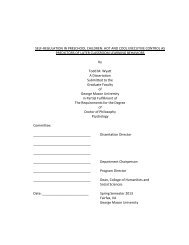
![[Sample B: Approval/Signature Sheet] - George Mason University](https://img.yumpu.com/21978828/1/190x245/sample-b-approval-signature-sheet-george-mason-university.jpg?quality=85)
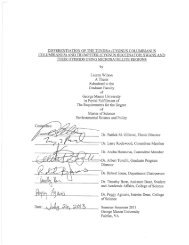
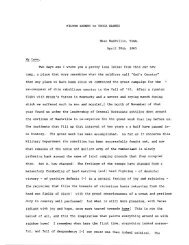
![[Sample B: Approval/Signature Sheet] - George Mason University](https://img.yumpu.com/18694905/1/190x245/sample-b-approval-signature-sheet-george-mason-university.jpg?quality=85)
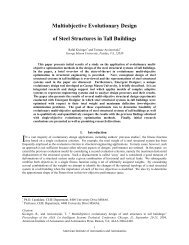
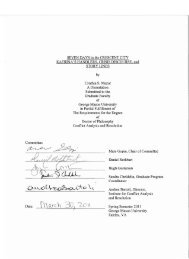
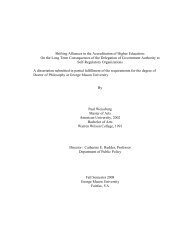
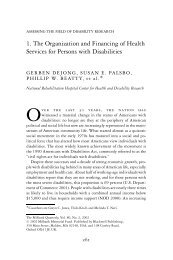
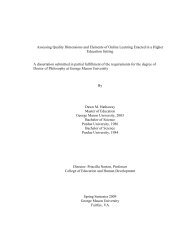
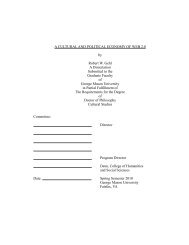
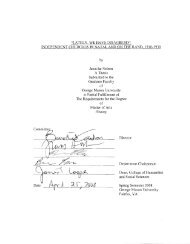
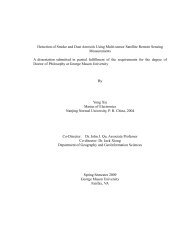
![[Sample B: Approval/Signature Sheet] - George Mason University](https://img.yumpu.com/18694474/1/190x245/sample-b-approval-signature-sheet-george-mason-university.jpg?quality=85)